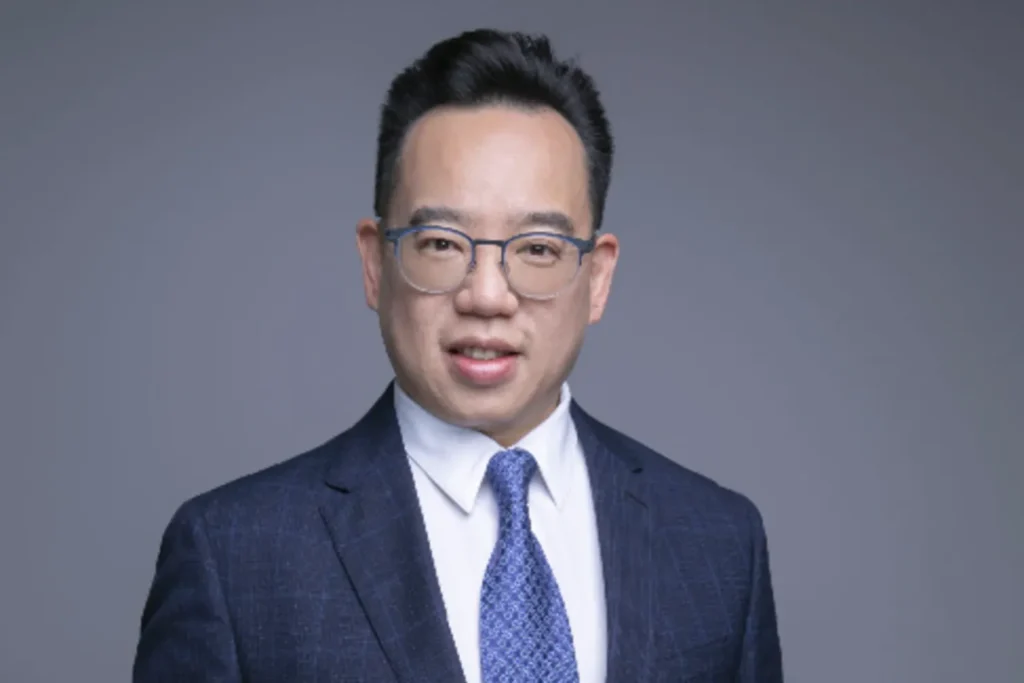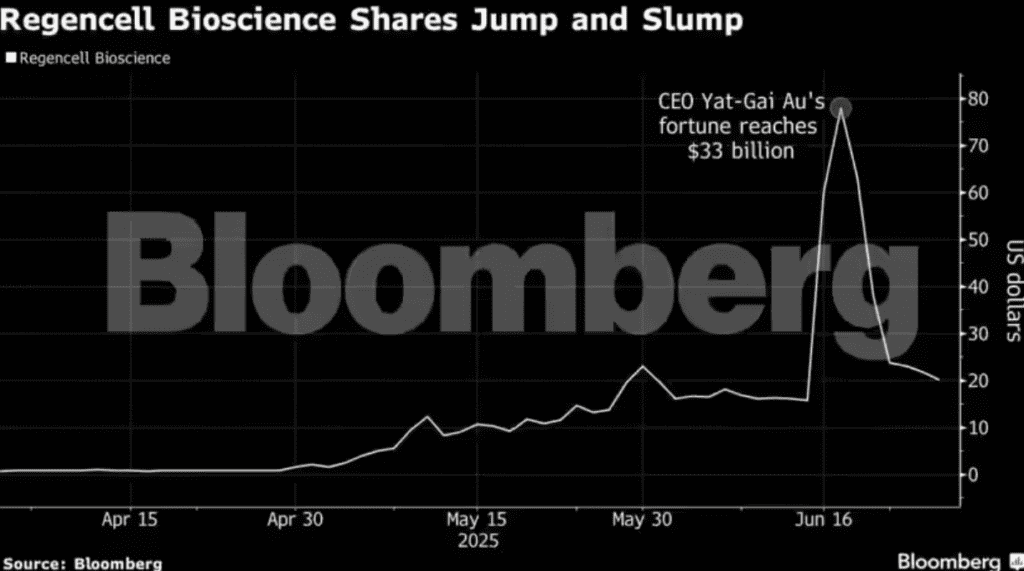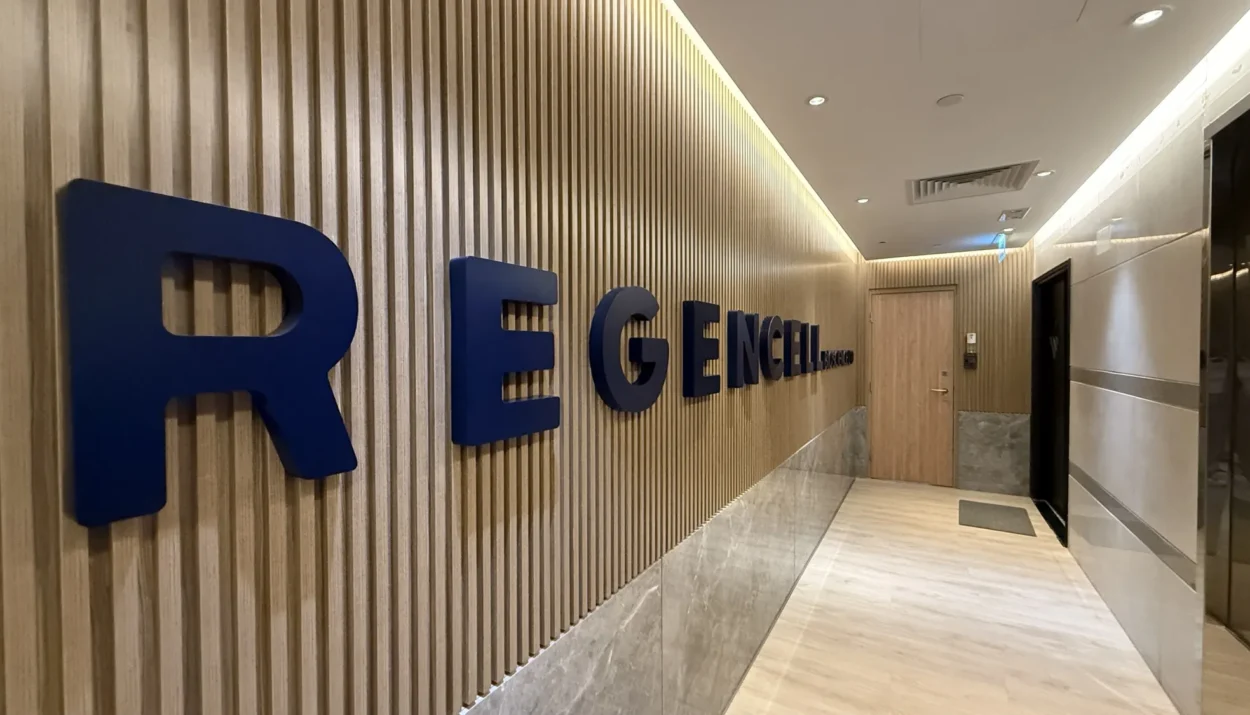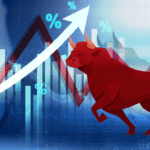When Yat-Gai Au was worth $33 billion on paper, he wasn’t in his Hong Kong office.
One week later, when his net worth plunged to just over $10 billion, he wasn’t there either.
At Regencell Bioscience Holdings Ltd’s headquarters in the heart of Hong Kong’s Causeway Bay, staff told reporters both times that Au, the company’s elusive CEO, only makes brief visits. Behind the doors of the firm’s sleek 9th-floor suite — complete with a ping-pong table in the reception — the air of mystery only deepens.
The Nasdaq-listed company, incorporated in the Cayman Islands, saw its shares skyrocket more than 82,000% this year. That stunning rise made Au, who holds an 86% stake, wealthier on paper than Hong Kong tycoons like Li Ka-shing — if only for a moment.
But almost as quickly, Regencell’s stock tumbled. As of June 26, shares had lost 74% of their value from the peak, dragging Au’s estimated fortune down to around $8.6 billion.

What Is Regencell?
Founded in 2014, Regencell markets and licenses traditional Chinese medicine (TCM) formulas, focused on treating ADHD and autism. The remedies, branded under “Brain Theory,” were developed by Au’s father, Sik-Kee Au, and the company holds exclusive rights to them.
Despite its astronomical market valuation, Regencell reported $4.4 million in net losses for fiscal 2024 and $6.1 million in losses for 2023. It has no revenue to date. The firm also hasn’t had a chief medical officer since 2022, when the last doctor resigned.
Its founder, Yat-Gai Au, studied at UC Berkeley’s Haas School of Business and worked at Deutsche Bank in the 1990s. In a video on Regencell’s Instagram, he claims to have suffered from learning disorders and an uncontrollable temper as a child — challenges he says inspired the company’s mission to “improve and save lives” with holistic treatment.
That same Instagram account now boasts over 500,000 followers — dwarfing even major health companies in Asia — thanks in part to flashy giveaways, including Taylor Swift concert tickets.

The Frenzy and the Fall
The stock mania erupted following a 38-for-1 stock split, a move that ballooned the share count and seemingly unleashed a speculative buying spree. At its peak, Regencell’s market cap surpassed established global names like Kraft Heinz and Lululemon.
However, the company’s unusual structure raised eyebrows. With over 86% of shares controlled by Au, only a thin slice of the stock is freely traded — a classic setup for price manipulation, according to analysts.
Experts say the case bears hallmarks of a pump-and-dump scheme — where prices are artificially inflated, then dumped for a profit.
Richard Harris, CEO of Port Shelter Investment Management, said the erratic stock movements are “certainly enough to trigger interest by investigators.”
Regulatory Radar
Both the US Securities and Exchange Commission (SEC) and Financial Industry Regulatory Authority (FINRA) declined to comment on whether they’re investigating Regencell. But FINRA reiterated it continuously monitors unusual trading activity as part of its investor protection mission.
The SEC, meanwhile, is considering a revision of its rules on foreign private issuers, which currently allow companies like Regencell to avoid quarterly financial disclosures or insider trading transparency — a loophole critics say could invite abuse.
University of Michigan professor Erik Gordon noted that modern SEC tools can now automatically detect anomalies, and regulators can demand disclosure from companies experiencing extreme price action — particularly when no relevant news is present.
“What’s interesting,” Gordon added, “is there’s no news.”
A Company That Won’t Talk
Repeated attempts by Bloomberg reporters to reach Regencell went unanswered. The firm has remained silent through both the rise and fall of its valuation. On June 18, visitors to the Hong Kong office seeking treatment were told staff weren’t doctors and referred to the website.
The company’s second-largest shareholder is Digital Mobile Venture Ltd., owned by Taiwan’s Samuel Chen and Fiona Chang — known for their early stake in Zoom Video Communications, which skyrocketed during the pandemic. Their family also controls Polaris Group, a Taipei-based biotech firm, and Sonix Technology, a chip company. Neither entity has responded to requests for comment.
A $33 Billion Reminder
In a market environment filled with retail exuberance, trade fears, and fast money, Regencell’s meteoric rise and fall serves as a cautionary tale.
A company with no revenue, no medical officer, and no clear explanation suddenly created one of the world’s richest men — and erased most of that fortune in just a few days.
Whether regulators will step in remains to be seen. But the story of Regencell is already one for the financial history books — a surreal mix of TCM, Taylor Swift tickets, and a paper empire built on thin air.
Disclosure: This article does not represent investment advice. The content and materials featured on this page are for educational purposes only.
Related:
The $OST Scam: How Nasdaq-Listed Penny Stock Wiped Out Thousands of Lives
Why Palantir Stock Is Sinking Today
Trump’s Tariff Deadline? ‘Not Critical,’ Says White House
Nike Reports After the Bell: Here’s Why Wall Street Expects a Weak Quarter
US IPOs Soar 53% in 2025, Led by Circle and CoreWeave — But Can the Boom Last?
In a First-of-Its-Kind Decision, Anthropic and Meta Win Copyright Lawsuits Brought by Authors










